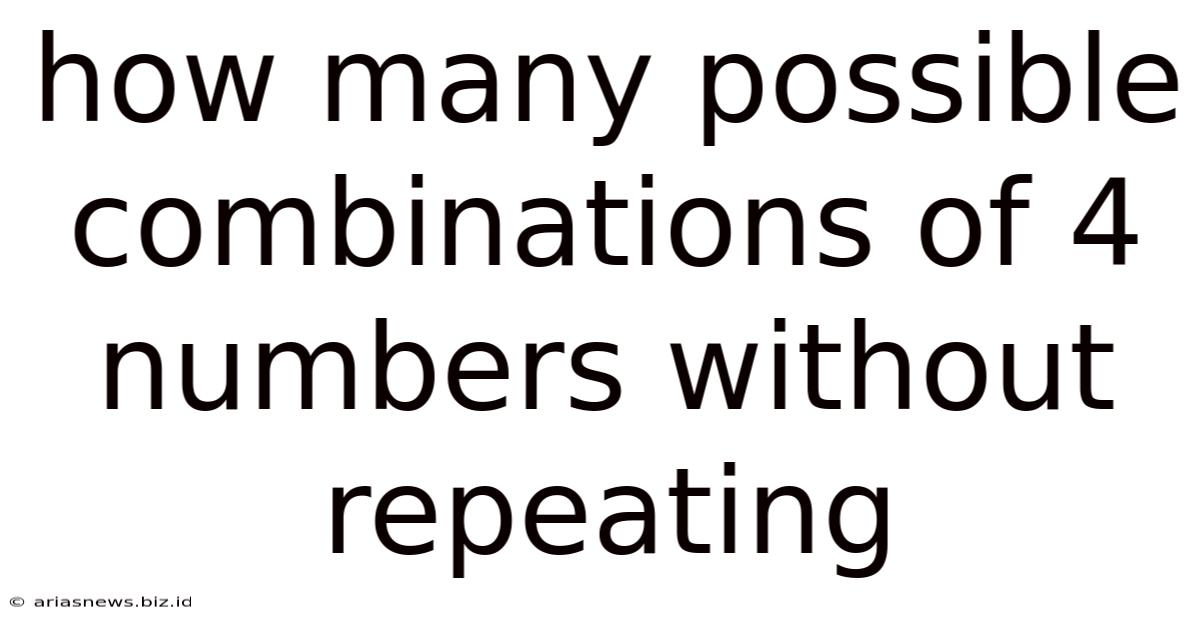How Many Possible Combinations Of 4 Numbers Without Repeating
Arias News
May 12, 2025 · 4 min read

Table of Contents
How Many Possible Combinations of 4 Numbers Without Repeating?
Unlocking the world of permutations and combinations can feel daunting, but understanding the fundamental concepts is key to solving a wide range of problems, from lottery odds to password security. This comprehensive guide delves into the question: How many possible combinations of 4 numbers without repeating are there? We'll explore the mathematical principles behind finding the answer, examine different scenarios based on the range of numbers available, and provide practical examples to solidify your understanding.
Understanding Permutations and Combinations
Before we dive into the specifics of four-number combinations, let's clarify the difference between permutations and combinations:
-
Permutations: Consider the order of elements. If you arrange the numbers 1, 2, and 3, the arrangements (1, 2, 3), (1, 3, 2), (2, 1, 3), (2, 3, 1), (3, 1, 2), and (3, 2, 1) are all considered distinct permutations.
-
Combinations: Ignore the order of elements. The sets {1, 2, 3}, {1, 3, 2}, {2, 1, 3}, {2, 3, 1}, {3, 1, 2}, and {3, 2, 1} are all considered the same combination because they contain the same elements.
Our problem specifically asks about combinations without repetition, meaning each number can only be used once.
Calculating Combinations Without Repetition (nCr)
The formula for calculating combinations without repetition is given by the binomial coefficient:
nCr = n! / (r! * (n - r)!)
Where:
- n represents the total number of items to choose from.
- r represents the number of items you are selecting.
- ! denotes the factorial (e.g., 5! = 5 * 4 * 3 * 2 * 1).
This formula essentially counts the number of ways to choose a subset of 'r' items from a set of 'n' items, without regard to the order.
Scenarios and Examples
Let's explore different scenarios based on the available numbers:
Scenario 1: Using numbers 0-9
If you're choosing 4 numbers from the set of digits 0-9 (ten digits in total), then:
- n = 10 (total numbers available)
- r = 4 (numbers to be chosen)
Plugging these values into the formula:
10C4 = 10! / (4! * (10 - 4)!) = 10! / (4! * 6!) = (10 * 9 * 8 * 7) / (4 * 3 * 2 * 1) = 210
Therefore, there are 210 possible combinations of 4 numbers without repetition, using digits 0-9.
Scenario 2: Using numbers 1-50
Let's increase the range. If we're choosing 4 numbers from 1 to 50, then:
- n = 50
- r = 4
50C4 = 50! / (4! * 46!) = (50 * 49 * 48 * 47) / (4 * 3 * 2 * 1) = 230300
In this case, there are 230,300 possible combinations.
Scenario 3: Using numbers 1-100
Extending the range further to numbers 1-100:
- n = 100
- r = 4
100C4 = 100! / (4! * 96!) This calculation becomes quite large and is best handled with a calculator or software capable of handling large factorials. The result is 3,921,225 combinations.
The Impact of Range
As you can see, the number of possible combinations increases dramatically as the range of numbers expands. This highlights the importance of understanding this mathematical principle in various applications.
Practical Applications
Understanding combinations without repetition is crucial in numerous fields:
- Lottery Calculations: Determining the odds of winning a lottery involves calculating the number of possible combinations.
- Password Security: The more characters and character types (numbers, letters, symbols) you use in a password, the more combinations are possible, thus increasing security.
- Sampling and Statistics: Selecting a representative sample from a larger population involves combination calculations.
- Combinatorial Optimization: Solving problems that require finding the best combination of elements (e.g., route optimization, resource allocation).
- Cryptography: The generation and analysis of cryptographic keys often rely on principles of combinations and permutations.
Beyond Four Numbers
The principles discussed above can be extended to determine combinations for any number of selections from a given range. If you need to find combinations for 5, 6, or more numbers, simply adjust the values of 'n' and 'r' in the formula.
Software and Calculators
For larger values of 'n' and 'r', using a calculator or software that can handle factorials is recommended. Many online calculators and mathematical software packages (like Wolfram Alpha) can easily calculate binomial coefficients.
Conclusion
The number of possible combinations of 4 numbers without repeating depends entirely on the range of numbers you're choosing from. By understanding the formula for combinations without repetition (nCr) and applying it to different scenarios, you can accurately calculate the number of possibilities. This knowledge extends beyond simple number combinations and has practical applications in various fields requiring combinatorial analysis. Remember, the larger the range of numbers, the exponentially larger the number of possible combinations becomes. Mastering this concept provides a valuable tool for solving problems in probability, statistics, and many other disciplines.
Latest Posts
Latest Posts
-
How To Address A Letter To A Nursing Home Resident
May 12, 2025
-
Can Bearded Dragons Eat Brussel Sprout Leaves
May 12, 2025
-
How Many Right Angles Does Trapezoid Have
May 12, 2025
-
Kohler 52 50 02 S Cross Reference
May 12, 2025
-
How Much Is 1 Acre Of Land In Mexico
May 12, 2025
Related Post
Thank you for visiting our website which covers about How Many Possible Combinations Of 4 Numbers Without Repeating . We hope the information provided has been useful to you. Feel free to contact us if you have any questions or need further assistance. See you next time and don't miss to bookmark.